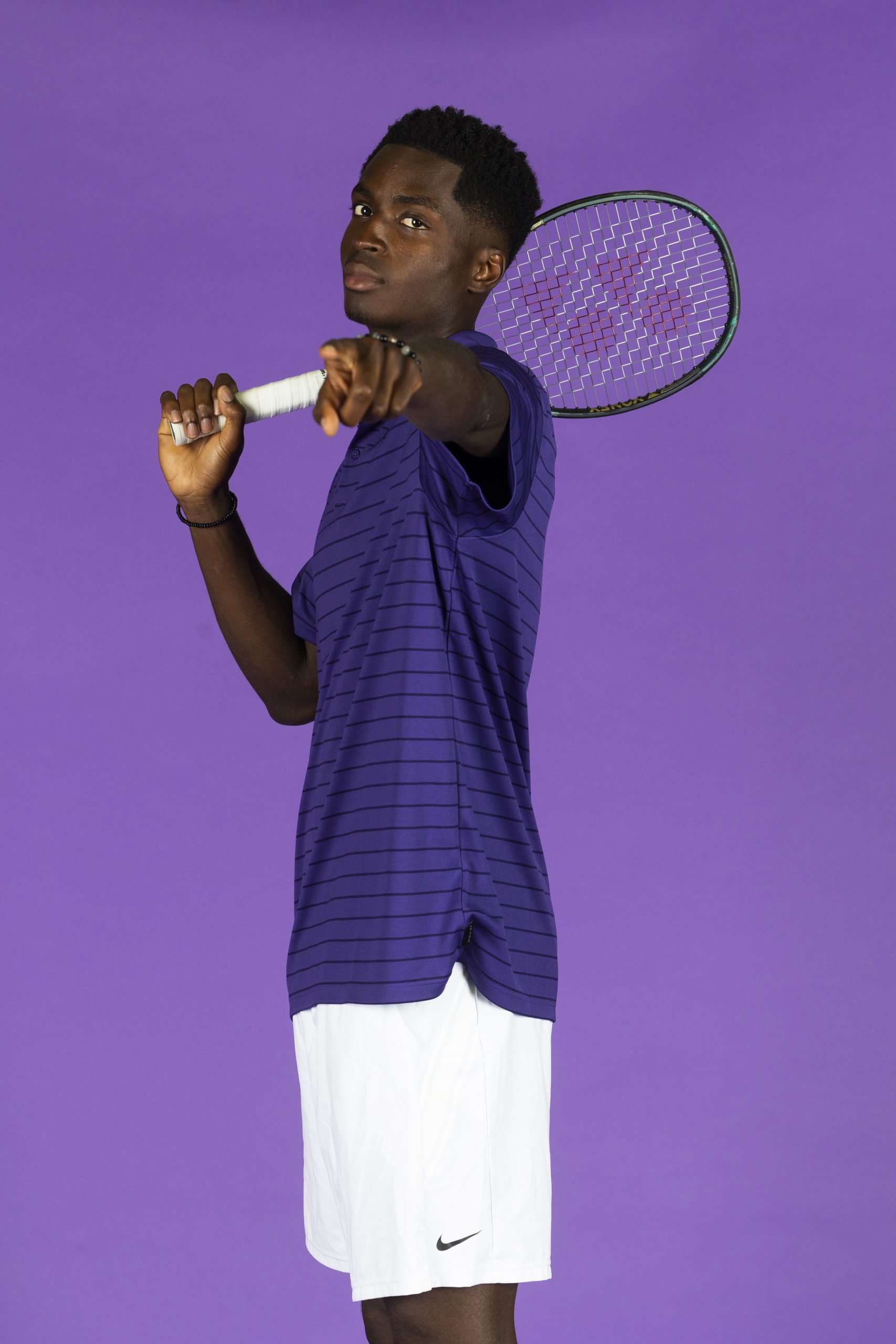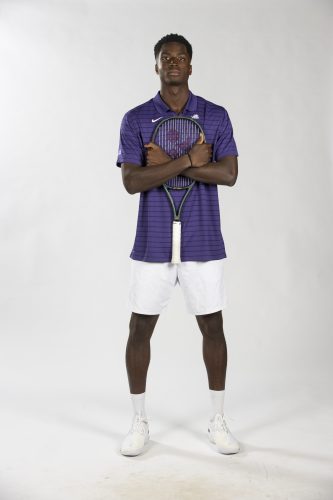Luc Fomba Rules the Court
The Frenchman credits TCU with upping his tennis game.

Luc Fomba says he is ready for the professional tennis circuit after leading the Frogs for his final year of eligibility. Courtesy of TCU Athletics | Ellman Photography
Luc Fomba Rules the Court
The Frenchman credits TCU with upping his tennis game.
Fan favorite Luc Fomba ’22 dominates the purple courts with his lethal serve, imposing physical presence and outsized personality. A native of France who grew up near Paris, the 6-foot-5-inch ace came to Fort Worth in August 2018 to play for the Horned Frogs and Coach David Roditi ’96. In February 2022, he led his team as its top player to win the ITA Indoor National Championship, a first for TCU. Later that season, the team co-captain became a four-time All-American who also earned a national seed in the NCAA tournament for the second year in a row.
You’re playing your fifth year at TCU thanks to the pandemic rules that let you compete an extra year. How does it feel to be leading the team a final time?
When I was younger, in France, I was just playing for myself. Tennis, it’s not really like a team sport where I came from, so TCU was a big change for me. When I came here I had to learn how to play not just for me but also for the school, for the name of TCU, for my teammates. That was a big change for me, but now I’m loving it. I feel it’s so fun.I wish more people would come to college to feel this energy of all the people around you.
You started playing tennis at 5 years old in part because your siblings, an older sister and brother, both played. When did you realize you were so good?
I was always tall for my age, and I played with both my brother and sister when I was young. My dad brought me to the tennis club. I started taking lessons when I was maybe 10. I was in the top three for my age group between 10 and 17.
What did your high school training look like?

“My goal was always to be a top player. I didn’t just want to play tennis. I wanted it to be my full-time future, so I had to make some sacrifices for sure.” – Luc Fomba. Courtesy of TCU Athletics | Ellman Photography
I was in class from 9 to 1 o’clock, and then I was going to my club to practice with my coach and two other players. I was practicing from 3 o’clock until 5 or 6 p.m., and after that I’d come back home. I would come home starving every night, and my mom would cook and give me a big portion of food, French meals.
Did you feel like you were missing out on normal teenage life?
My goal was always to be a top player. I didn’t just want to play tennis. I wanted it to be my full-time future, so I had to make some sacrifices for sure. Like not going out too much with my friends, not smoking as my friends did, that kind of stuff. I was very focused on my goals, and I had to be smart about my choices, which wasn’t always easy.
What were some of the advantages of playing in Europe?
I was able to play all around France and travel to a bunch of countries like Belgium, Italy, Spain, Qatar, Dubai, Malta and Greece.
Tell us about the transition to Texas. Any challenges?
It was a big change. I had studied English in school, but when I got here it was hard. About two months in I started understanding the language and having an easier time in my classes. There were tough moments for sure, but I knew this was a big chance for me.
What were some of your most memorable moments during those early years at TCU?
I lived in Tom Brown my first year with two roommates who played basketball. That was cool for me. I love to watch the NBA, so it was fun to go to basketball games. I’m not really a big fan of football because in France it’s not a big sport, but sometimes I would go with my friends just to watch the guys.
You’ve met with tremendous success on the purple courts as a top-ranked player nationally in both singles and doubles. Which do you prefer?
It is difficult to say. I have had great doubles partners at TCU. I played doubles with Alastair Gray ’21 in my second year, I believe. He’s now playing professionally. Now I’m with Jake Fearnley, who is a good friend. It’s very easy for us to know what it is the other is going to do and what they are thinking right now. But with singles it’s like everything is my own choice, and I get to play a bit more freely. If I mess up it’s on me.
Does the TCU crowd make an impact on your play?
It’s a big boost for me, you know? I love the show, the people being around and loud and screaming, “Go Frogs,” “Let’s go, Luc,” “Big Ace!” In Europe, people just applaud, but it’s not like they scream. It’s nice for me to have people around for the big matches.
“I’m 6 foot 5 inches, so it’s easier for me to serve bombs. I’m sure it’s mentally tough for my opponents when I ace them again and again.”
Luc Fomba
You’ve obviously grown as a player during your time at TCU, considering that you were nationally ranked in the teens last season. What’s helped you achieve your goals?
The coaching is incredible. David [Roditi] and Devin [Bowen ’94] are the best college coaches in the country, I believe. They have both played at a high level professionally. They always talk to us about what is good to do, like you should eat that at this time of the day, to drink more, to take care of school.
Your serve is lethal!
I’m 6 foot 5 inches, so it’s easier for me to serve bombs. I’m sure it’s mentally tough for my opponents when I ace them again and again.
Who’s your favorite player on the tour right now?
Roger Federer but now he’s pretty old so he’s not playing tennis. But I just love him. I can watch him play for hours. I have a one-handed backhand, so he’s a model for me.
Some of those old guys, like Rafael Nadal, are still playing even through pain. Do you have pain?
I’m not like him but yeah, I do have some pain with my body for sure. I feel pain is like part of this process. You always have something, but you just have to forget that and go on the court and fight.
You are done in May! What’s next?
I want to play professionally. I’m ready to go on the tour after this year. I’m not sure yet if I’m staying here to practice or I could go back to France. I am going to talk with the coach more deeply about that and my parents, too. I want to go play the Grand Slams and play the French Open, the U.S. Open. I watch the players play there and I’m just like, I want to be there also, you know. Why not me?
Editor’s Note: The questions and answers have been edited for length and clarity.

Your comments are welcome
Comments
Related reading:
Features, Sports: Riff Ram
Men’s Tennis Serves Up Success
Hard work and positive motivation help alumni coaches transform the team into national champions.
Alumni, Sports: Riff Ram
Cameron Norrie’s Smashing Success
A Horned Frog legend reached the semifinals at Wimbledon.